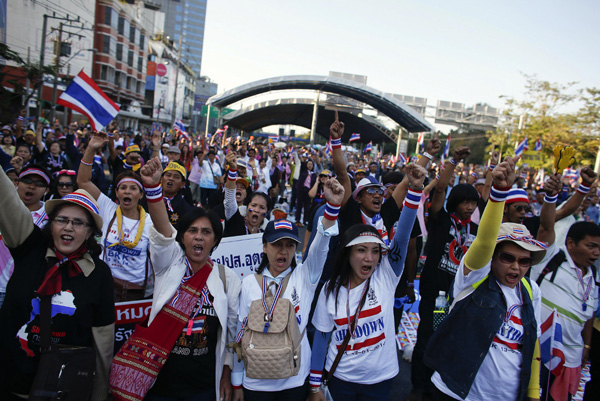

 |
|
Anti-government protesters block the road at one of major intersections in central Bangkok January 13, 2014. [Photo/Agencies] |
"Suthep is only a proxy for arch-royalist interests. His role has always been to bring out crowds to create popular legitimacy which might facilitate any judicial or military intervention," said Paul Chambers, director of research at the Institute of South East Asian Affairs in Chiang Mai.
Last week, Thailand's anti-corruption body pressed charges against 308 politicians, mostly from Yingluck's Puea Thai Party, for trying to change the constitution by making the Senate a fully elected body.
The charges could lead to them being kicked out of parliament if they retake their seats in February.
BOTCHED AMNESTY
Although rumours of a coup are rife, the military, which has staged or attempted 18 coups in 81 years of on-off democracy, has tried to stay neutral this time and army chief Prayuth Chan-ocha has publicly refused to take sides.
But some fear extremists or agents provocateurs could instigate violence to provoke military intervention, leading to a repeat of 2010 when more than 90 people, many of them Thaksin supporters, were killed in an army operation to put down a rally that had closed parts of central Bangkok for weeks.
"The government will let Suthep play the hero tomorrow ... It will be his show," Labour Minister Chalerm Yoobamrung said at a government briefing on Sunday. "There won't be a repeat of 2010 because the government will not use that strategy. There are no plans to use force."
The latest protests took off in November, when the government tried to force through a political amnesty that would have let Thaksin return without serving jail time for corruption. The bill was ultimately withdrawn but the protests gathered pace.
Yingluck's party would probably win the February poll thanks to support from voters in the north and northeast.
But a smooth election looks increasingly unlikely, with the protesters determined to install an appointed "people's council" to change the electoral system and push through other reforms to weaken Thaksin's sway.
The unrest has hurt tourism and further delayed huge infrastructure projects that had been expected to support the economy this year at a time when exports remain weak. Consumer confidence is at a two-year low.
City officials have told 140 schools to close on Monday and universities near the protest sites have suspended classes.
Protest leaders want to stop ministries functioning but say they will not shut down public transport or the city's airports. Anti-Thaksin protesters shut the airports for several days in late 2008, causing chaos for tourists and exporters.
The government will deploy 10,000 police to maintain law and order, along with 8,000 soldiers at government offices.
"We don't want confrontation with the protesters ... In some places we will let them into government buildings," Foreign Minister Surapong Tovichakchaikul told the briefing.
The government did the same thing in early December, ordering police to step aside and let demonstrators into the grounds of the prime minister's office, defusing a violent confrontation without halting the protest movement.